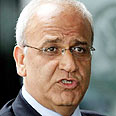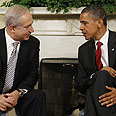

US President Barack Obama and Prime Minister Benjamin Netanyahu want direct talks soon on a Middle East peace treaty, but Palestinian President Mahmoud Abbas is wary of walking into a trap.
The Palestinians insist on keeping Israel at arm's length until it makes certain things clear – namely, what size and shape of Palestinian state is Netanyahu prepared to consider, and will its Jordan Valley be free of Israeli troops?
Indirect talks initiated in May by US mediator George Mitchell are about halfway through their agreed four-month lifetime. They are to conclude in September, around the same time as a partial freeze that Netanyahu ordered last November on Israeli settlement building on occupied West Bank land.
Israel says the current "proximity talks" are wasting time.
"What we want to see finally is one thing. We want President Abbas to grasp my hand ... to shake it, sit down and negotiate a final settlement of peace," Netanyahu said on Wednesday.
Obama's endorsement of that goal at the White House meeting on Tuesday was a sign that moving swiftly to direct negotiations well before September is vital to keeping the process alive.
"The key to direct talks is in the hand of Prime Minister Netanyahu," said chief Palestinian negotiator Saeb Erekat. "The minute he announces a (total) settlement freeze, the minute he announces the resumption of final status (talks) where we left them in December 2008, we will have direct talks".
The Palestinians note they have had a "peace process" for the best part of 17 years, yet remain under Israeli occupation.
They say they have cooperated with three US presidents with differing levels of commitment to the process, but with the same result. So they are wary of being pushed into a negotiation where they can be made to look like rejectionists.
Hamas: Direct talks a trap
The Hamas movement on Wednesday warned the Palestinian Authority against resuming the negotiations. According to Hamas spokesman, Dr. Sami Abu Zuhri, the Obama-Netanyahu meeting proved that there was no chance for a change in the American policy in light of the continued American support for Israel.
"Returning to negotiations with the occupation would be a national crime and provide the enemy with a cover up to continue its crimes against the Palestinian people and its holy places," Abu Zuhri warned.
He added that Obama's remarks about the easing of the Gaza blockade were an attempt to beautify the Israeli blockade and legitimize its continuation.
Dr. Salah Bardawil, chairman of Hamas' parliament faction, warned the PA against "falling into a trap". He called on the PA to renege on the "scandal" of entering negotiations and return to the ranks of the Palestinian people.
Around and around
Direct talks with the previous Israeli government of Ehud Olmert collapsed when Israel bombed the Gaza Strip 18 months ago to suppress rocket fire from Palestinian Islamists headed by the Hamas movement, which rejects a peace treaty with Israel.
In a Cairo speech 13 months ago, Obama said: "The US does not accept the legitimacy of continued Israeli settlements. This construction violates previous agreements and undermines efforts to achieve peace. It is time for these settlements to stop."
US pressure restarted the process in 2009. But Palestinian President Mahmoud Abbas was politically embarrassed when Obama later retreated on his call for a total settlement freeze.
A report this week by the Israeli human rights group B'Tselem says more than 300,000 Israelis now live on 42 percent of the West Bank land where the Palestinians want to establish their future country in a "two-state solution" with Israel.
Obama may have prevailed on Netanyahu last year to publicly commit himself to a two-state future, said Abbas' aide Nabil Abu Rdainah. But what exactly does Netanyahu mean by that?
"If we enter direct talks without clear principles regarding the nature of the future Palestinian state, the Israelis can turn and say: 'We offered you a state and you didn't want it,'" he told Reuters.
"We don't want to be blamed in the next phase of talks for turning down an offer for a Palestinian state on, say, 60% of the West Bank."
"We want to enter direct negotiations that have the goal of creating a Palestinian state on 1967 borders with a few land swaps ... We want to know what we are negotiating on ... Netanyahu doesn't want to say."
Gaza adrift
In talks mediated by former US Secretary of State Condoleezza Rice the Israelis acknowledged that occupied land means the Gaza Strip, the West Bank, Arab East Jerusalem, the Dead Sea and the Jordan Valley, Abu Rdainah said.
But some rightwing members of Netanyahu's coalition say there is no point talking about this with Abbas because he has no control over the Gaza Strip and the 1.5 million Palestinians living there under the rule of Hamas, his arch-rival, and cannot deliver any security guarantees to Israel.
Besides stating the approximate geographical framework of the state Israel is ready to agree to, said the Palestinian presidential aide, the other main issue is security.
"Once the Palestinian state is established, we are ready to have a third party to oversee security and we do not want to have Israel controlling our borders with Jordan. We would agree to have international forces from NATO or another organization. But Israel doesn't want any foreign presence there," he said.
The Palestinians are now waiting to hear next week from Mitchell on what happened during Obama's talks with Netanyahu and what "concrete steps" are in the works to build confidence sufficient to launch direct talks.
Netanyahu told US television on Wednesday he was ready to order "additional easing of movements" for the Palestinians in the West Bank, but ducked a question about whether he would extend the freeze on settlement building.
"If they mean removing a checkpoint here and there, then this has no significance. We need tangible steps," said Abu Rdainah.
- Follow Ynetnews on Facebook















